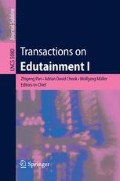Abstract
A ubiquitous learning environment provides learners opportunities of observing and touching the learning objects around the learners according to their preferences and/or interests. Learners can solve problems, answer questions, and propose their own questions, in the ubiquitous learning environment. However, it is still a serious topic to learners and most of them only do learning when they really have to, because it is a learning task. Games have many features which make learners have higher motivation in learning and have willing in learning actively. Moreover, the ‘stage’ concept in the games is also a big factor which might attract learners doing continuous learning, because the learners feel they really accomplished something and want to challenge further. In this paper, we first use small stories and activities to figure out what the learners interests with, which means, make learners call; and, build the personalized knowledge structure for the learner according to his/her choices and interests. With the helps of the context-awareness knowledge structure, we designs and builds learning scenes to offer learners the personalized learning services based on the ‘stage’ concept in the game. Each learning scene may cover one or many learning spots, and each learning spot has different learning objects. We can construct a series of learning scenes dynamically for individual learner based on the learner’s choices, preferences and interests. Furthermore, a learning path involves learning scene switching is also generated automatically for the learner. A scenario with several exhibition rooms and artifacts in a museum is used to demonstrate the idea and mechanism proposed by this research.
Access this chapter
Tax calculation will be finalised at checkout
Purchases are for personal use only
Preview
Unable to display preview. Download preview PDF.
References
Brodersen, C., Christensen, B.G., Dindler, C., Grønbæk, K., Sundararajah, B.: eBag—a Ubiquitous Web Infrastructure for Nomadic Learning. In: Proceedings of the 14th International Conference on World Wide Web Conference, Chiba, Japan, May 10-14, 2005, pp. 298–306 (2005)
Chang, A., Chang, M.: Adaptive Mobile Navigation Paths for Elementary School Students Remedial Studying. In: Proceedings of the IEEE International Conference on Interactive Computer Aided Learning (ICL 2006), Villach, Austria, September 27-29 (2006)
Chang, A., Chang, M.: A Treasure Hunting Learning Model for Students Studying History and Culture in the Field with Cellphone. In: Proceedings of the 6th IEEE International Conference on Advanced Learning Technologies (ICALT 2006), Kerkrade, The Netherlands, July 05-07, 2006, pp. 106–108 (2006)
Chang, A., Chang, M., Heh, J.S.: Implementing a Context-aware Learning Path Planner. In: the Proceedings of the 6th WSEAS International Conference on E-ACTIVITIES, Tenerife, Canary Islands, Spain, December 14-16, 2007, pp. 237–241 (2007)
Chen, Y.-S., Kao, T.-C., Yu, G.-J., Sheu, J.-P.: A Mobile Butterfly-Watching Learning System for Supporting Independent Learning. In: Proceedings of the IEEE International Workshop on Wireless and Mobile Technologies in Education, Chung-Li, Taiwan, March 23-25, 2004, pp. 11–18 (2004)
El-Bishouty, M.M., Ogata, H., Yano, Y.: Personalized Knowledge Awareness Map in Computer Supported Ubiquitous Learning. In: Proceedings of the 6th IEEE International Conference on Advanced Learning Technologies (ICALT 2006), Kerkrade, The Netherlands, July 05-07, 2006, pp. 817–821 (2006)
Felder, R.M., Brent, R.: Learning by Doing. Chemical Engineering Education 37(4), 282–283 (2003) Retrieved on January 15, 2008 from, http://www4.ncsu.edu/unity/lockers/users/f/felder/public/Columns/Active.pdf
Hwang, G.-J.: Criteria and Strategies of Ubiquitous Learning. In: Proceedings of the IEEE International Conference on Sensor Networks, Ubiquitous, and Trustworthy Computing (SUTC 2006), Taichung, Taiwan, June 5-7, 2006, pp. 72–77 (2006)
Hall, T., Bannon, L.: Designing ubiquitous computing to enhance children’s learning in museums. Journal of Computer Assisted Learning 22(4), 231–243 (2006)
Kuo, R., Wu, M.-C., Chang, A., Chang, M., Heh, J.-S.: Delivering Context-aware Learning Guidance in the Mobile Learning Environment based on Information Theory. In: Proceedings of the 7th IEEE International Conference on Advanced Learning Technologies (ICALT 2007), Niigata, Japan, July 18-20, 2007, pp. 362–366 (2007)
Lepper, M.R., Malone, T.W.: Intrinsic motivation and instructional effectiveness in computer-based education. In: Aptitude, Learning, and Instruction, III: Conative and Affective Process Analysis, pp. 255–286. Lawrence Erlbaum Associates, Hillsdale (1987)
Malone, T.W.: Toward a theory of intrinsically motivating instruction. Cognitive Science 5(4), 333–369 (1981)
Malone, T.W., Lepper, M.R.: Making learning fun: A taxonomy of intrinsic motivations for learning. In: Aptitude, Learning, and Instruction, III: Conative and Affective Process Analysis, pp. 223–253. Lawrence Erlbaum Associates, Hillsdale (1987)
Novak, J.D.: Applying learning psychology and philosophy of science to biology teaching. The American Biology Teacher 43(1), 12–20 (1981)
Novak, J.D., Gowin, D.B.: Learning How to Learn. Cambridge University Press, New York (1984)
Ogata, H., Yano, Y.: Knowledge awareness for a computer-assisted language learning using handhelds. International Journal of Continuous Engineering Education and Lifelong Learning 14(4/5), 435–449 (2005)
Pawlak, Z.: Rough Sets: Theoretical Aspects of Reasoning about Data. Kluwer Academic Publishers, Norwell (1992)
Wu, S., Chang, A., Chang, M., Liu, T.-C., Heh, J.-S.: Identifying Personalized Context-aware Knowledge Structure for Individual User in Ubiquitous Learning Environment. In: Proceedings of the 5th IEEE International Conference on Wireless, Mobile, and Ubiquitous Technologies in Education (WMUTE 2008), Beijing, China, March 23-26, 2008, pp. 95–99 (2008)
Yatani, K., Sugimoto, M., Kusunoki, F.: Musex: A System for Supporting Children’s Collaborative Learning in a Museum with PDAs. In: the Proceedings of the IEEE International Workshop on Wireless and Mobile Technologies in Education, Chung-Li, Taiwan, March 23-25, 2004, pp. 109–113 (2004)
Author information
Authors and Affiliations
Editor information
Rights and permissions
Copyright information
© 2008 Springer-Verlag Berlin Heidelberg
About this chapter
Cite this chapter
Chang, M., Wu, S., Heh, JS. (2008). Making the Real World as a Game World to Learners by Applying Game-Based Learning Scenes into Ubiquitous Learning Environment. In: Pan, Z., Cheok, A.D., Müller, W., El Rhalibi, A. (eds) Transactions on Edutainment I. Lecture Notes in Computer Science, vol 5080. Springer, Berlin, Heidelberg. https://doi.org/10.1007/978-3-540-69744-2_20
Download citation
DOI: https://doi.org/10.1007/978-3-540-69744-2_20
Publisher Name: Springer, Berlin, Heidelberg
Print ISBN: 978-3-540-69737-4
Online ISBN: 978-3-540-69744-2
eBook Packages: Computer ScienceComputer Science (R0)

